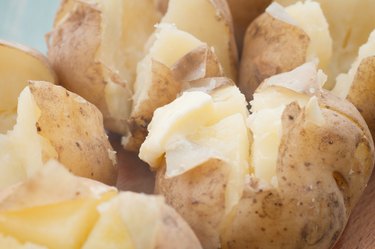
Although a sweet potato offers more fiber, vitamin A and vitamin C, a plain baked potato is not a nutritional zero. Both count towards your daily servings of vegetables and can be part of a healthy diet. Learn to prepare these vegetables in healthy ways to maximize their nutrition.
Calories and Macronutrients
Video of the Day
A baked potato weighing 173 grams and a baked sweet potato weighing about 180 grams both contain approximately 160 calories. Each provides 37 grams of carbohydrates and 4 grams of protein. Neither potato contains any fat.
Video of the Day
Fiber
A sweet potato provides about 50 percent more fiber than a white potato. Fiber helps keep stool moving smoothly through your digestive tract. Fiber also adds bulk to your meals, making you feel full for longer, and can also help lower your cholesterol levels, decreasing your risk of heart disease.
Vitamins
A 180 gram sweet potato provides almost 700 percent of the daily value for vitamin A, based on a 2,000-calorie diet. Vitamin A is essential to eye health and proper cellular function. A plain baked potato contains only trace amounts of vitamin A. A sweet potato also contains more vitamin C than a plain potato – 35 milligrams versus 17 milligrams. A baked potato, however, offers more folate – a B vitamin important to healthy red blood cells and essential in preventing certain birth defects. A baked potato contains 48 micrograms of folate, while a sweet potato contains just 11 micrograms.
Minerals
Both types of potatoes contain almost equal amounts of magnesium, phosphorus, copper, zinc and iron. Sweet potatoes contain slightly more calcium than regular baked potatoes. A baked potato offers more potassium, however, with 926 milligrams versus 855 milligrams in a sweet potato. Potassium is essential to regulating your mineral and fluid balance. Sweet potatoes provide a greater amount of the trace mineral manganese, which plays a role in bone health, nutrient absorption and a healthy central nervous system.
Considerations
The way you serve your baked sweet or white potato also affects the healthiness of your choice. If you load up your baked white potato with sour cream, butter and shredded cheese, you just upped the calorie and saturated fat content. Avoid dousing your baked sweet potato in butter and maple syrup, marshmallows or honey. Enjoy these potatoes plain, or perhaps with a bit of non-fat yogurt, chives, sea salt or cracked black pepper, to keep them as healthy as possible.
Glycemic Load
The glycemic load of food measures the way a food affects your blood sugar and insulin levels. A diet high in foods with a low glycemic load may have a positive effect on weight loss and type 2 diabetes, but research is inconclusive, notes the Harvard School of Public Health. The glycemic load of a sweet potato is 17 -- lower than the 26 of a baked russet potato. Generally, foods with a glycemic load of 20 or more are considered high, while 10 or under are low.